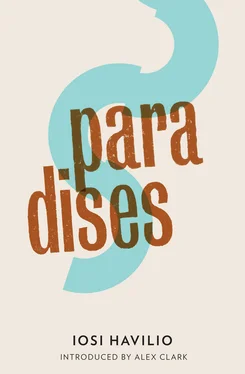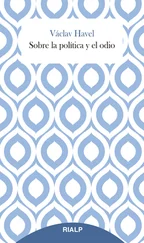Iosi Havilio - Paradises
Здесь есть возможность читать онлайн «Iosi Havilio - Paradises» весь текст электронной книги совершенно бесплатно (целиком полную версию без сокращений). В некоторых случаях можно слушать аудио, скачать через торрент в формате fb2 и присутствует краткое содержание. Год выпуска: 2013, Издательство: And Other Stories, Жанр: Современная проза, на английском языке. Описание произведения, (предисловие) а так же отзывы посетителей доступны на портале библиотеки ЛибКат.
- Название:Paradises
- Автор:
- Издательство:And Other Stories
- Жанр:
- Год:2013
- ISBN:нет данных
- Рейтинг книги:3 / 5. Голосов: 1
-
Избранное:Добавить в избранное
- Отзывы:
-
Ваша оценка:
- 60
- 1
- 2
- 3
- 4
- 5
Paradises: краткое содержание, описание и аннотация
Предлагаем к чтению аннотацию, описание, краткое содержание или предисловие (зависит от того, что написал сам автор книги «Paradises»). Если вы не нашли необходимую информацию о книге — напишите в комментариях, мы постараемся отыскать её.
is an almost perfect novel." — Albert Camus's
reimagined with a female lead in in twenty-first-century Buenos Aires.
Recently widowed, a young woman leaves the countryside for Buenos Aires with her four-year-old son where she seeks to build a new life for herself. She finds work in the zoo and moves into the human zoo of a squatted tower block at the invitation of one of its residents, to whom she acts as nurse, giving morphine injections.
Paradises — читать онлайн бесплатно полную книгу (весь текст) целиком
Ниже представлен текст книги, разбитый по страницам. Система сохранения места последней прочитанной страницы, позволяет с удобством читать онлайн бесплатно книгу «Paradises», без необходимости каждый раз заново искать на чём Вы остановились. Поставьте закладку, и сможете в любой момент перейти на страницу, на которой закончили чтение.
Интервал:
Закладка:
Earlier, in the middle of the night, I had nightmares, shivers and something that felt like fever but wasn’t. My stomach spasmed too, driving me blindly to the bathroom. I vomited three times in a row, everything I had eaten and more. Red, tomato-tinged vomit. As it was happening, I had the impossible feeling that I was bringing up small triangles, like mini portions of pizza that my intestines had taken the trouble to reshape before sending back to the surface.
Around midday, after spending all morning watching television — two news broadcasts, El Zorro , a cookery competition — I got out of bed when hunger started to make Simón grumpy. Aching bones, in my face and limbs, as if I had been stretched on the rack in my sleep. Leaving the room brought confirmation that it had been raining: pools of water in the corners and a small lake in the middle of the house. I put a pan of stew on to heat, left over in the fridge from two nights ago, Jaime’s last supper, and I picked up a tea towel to mop the floor.
At the end of the winter, Jaime had experienced a surge of uncharacteristic enthusiasm, finally ready to devote himself to a bit of home maintenance. After a great struggle, he had managed to retire, and now that he had he felt diminished. Fed up of doing odd jobs in faraway houses, repairing roofs, stopping drips, unblocking drains, he never took the step of fixing the leaks in our own home, although they multiplied after every rainfall, especially above the fireplace. He limited himself to putting out tubs, buckets or rags in the corners to catch the water. Until one cold morning he took out the big stepladder, the one for important jobs, and started cleaning out the gutters. He took out the earth, the dry leaves, all the accumulated mulch, and the task clearly spurred him on because that same night he announced: I’m going to raise the roof.
First he spent some time studying how to do it, whether to replace the broken tiles, remove the rotten struts or change a central, worm-ridden joist. He decided to go for a mixed approach: one part of the house, the kitchen, the bedrooms and the bathroom, would keep its original roof, and he would put corrugated iron over the other part. That’s what he said: I’ll rip off all this shit and put down corrugated iron. The job was half done: he had replaced the broken tiles with new ones and raised the roof, which he had covered with plastic sheeting, but the corrugated iron never arrived. On the night of the accident he was on his way to or back from buying it, I’ll never know which.
Clutching the tea towel, I stood distractedly for a while, my eyes fixed on that provisional, half-naked roof. When I had finished with the cloth, I leant into the bedroom to tell Simón the food was ready. I sat down and once again fixated on all the ornaments, lamps and old-fashioned junk that perhaps the time had come to start recycling. I realised that, somehow, this house belonged to me now, or at least it had ended up in my charge.
I pondered all this as Simón ate, playing at trying to squeeze his tiny elbows through the tines of the fork. I raised my eyes and fixed them on that plate hanging on the wall, with a blue border depicting a hunting scene. A plate Jaime had rescued not long ago, a reminder of his mother or grandmother that he had hung next to the window, the only decorative gesture I’d ever known him to make. In the middle, it read in cursive, sprawling writing:
Make a bigger door, Pa,
For I no longer fit,
You built it for the children;
I’ve grown, to my regret.
I realised that Simón was staring at me as intently as I was at the plate. The spoon, suspended dripping in the air, demanded my attention. When our eyes met, he smiled. An ambiguous smile, ironic yet kind, testing me, an adult smile, lips nearly sealed, identical to Jaime’s smirk in the coffin. I was about to say something to him, in fact I mentally rehearsed several phrases, but I failed in the attempt and kept quiet.
We had lived in this house for the last four years, moving less and less, going out only when necessary. No sudden shocks, obligations or big adventures. In fact, we had formed something that wasn’t far off a family. A family that was harmonious in its own way. We shared breakfasts, lunches and dinners. A frictionless family, each of us in our own little world. Now things had to change and my role was still to be determined.
We went out to the veranda. Simón started playing with some broken tiles, while I moved a few metres away from the house, my espadrilles sinking into the mud. I thought about the roof again. Corrugated iron, I thought, and said out loud: Corrugated iron. I couldn’t think of anyone who might take care of it. I remembered an old tarpaulin folded up under the mill. I set myself a challenge.
Manoeuvring the roll of canvas wasn’t easy. I dragged it as if it were a corpse, pulling it by the feet. Unbelievably, it was just about the right size. I climbed the ladder and lifted it, secured by a rope. I stretched out the plastic Jaime had put down and spread the canvas on top, nice and tight, pinning it in place at the edges with branches and stones, along the line of the crossbeams. I was exhausted and sweating heavily, a smell of burnt caramel rising from my armpits. It wasn’t the ideal solution but it would buy us some time.
The first week passed as if Jaime was still there. Prowling. Leaving at dawn and returning when we were already in bed. His presence was evident in every corner. In the dirty boots at the foot of the bed, in his clothes hanging in the wardrobe, in the shovel and the rake, covered in soil and dried grass. In the smells, too, in the room, the bed, the shed, the constant sweat, the dampness of the walls and that spicy tang impregnated in the sheets, which wasn’t exactly Jaime but which I always associated with him.
Naturally, Simón came to sleep with me, usurping the side made free by Jaime. The cot, which was actually getting too small for him, started to fill up with clothes, boxes and papers. Simón didn’t seem particularly bothered by his father’s absence. He didn’t look sad or quiet. Quite the opposite in fact; shedding his usual calm demeanour, he developed a series of skills, as if he were undergoing a sudden growth spurt: the tricycle he had previously used as a handcart or a seat from which to contemplate the horizon was now used for getting around. He was so excited by this novelty that he didn’t stop cycling back and forth from one end of the veranda to the other, pedalling as if possessed. Only once did he ask for Jaime, and after pausing for a long time to find a gentle but effective formula, I ended up saying: He had an accident, I don’t think he’ll be coming back. That’s how I put it: I don’t think. Simón listened to me with his brows furrowed, he stayed silent, sighed deeply as if commenting on the situation like an old village gossip, then returned to his pedalling. And that was it.
I, on the other hand, began to feel his absence more keenly as the days passed. I needed his hands to yank the water pump, to battle the rats and also, although he had barely done so recently, to touch me. It had been a long year since we had last made love, not even caresses; physical contact had been reduced to accidental brushes in bed, in the bathroom, going through a door. Now that he wasn’t here, it gripped me like a new kind of fever. A heat I could only calm with a lot of masturbation, every night, two or three times. Almost always thinking about the last Jaime, the one in the coffin; other times it was abstractions that turned me on in the darkness. Nervous rubbing, full of fury. Then it passed and I forgot about sex again, as before.
Without the pickup, we were more isolated than ever. Twice in one month we walked into Open Door, loaded up a taxi at the supermarket and came home. We hardly had any neighbours left. The few remaining shacks had disappeared the previous summer. Eloísa’s house too, the store-shed and the shop. We had witnessed machines razing the lot. I’d stopped seeing Eloísa before the demolitions. She’d moved to the capital and very occasionally came back to visit her parents. Only once did she approach the gate, and we had a short, awkward conversation, which Simón took it upon himself to interrupt with a tantrum. She hated Jaime, the baby; she liked me but not my life.
Читать дальшеИнтервал:
Закладка:
Похожие книги на «Paradises»
Представляем Вашему вниманию похожие книги на «Paradises» списком для выбора. Мы отобрали схожую по названию и смыслу литературу в надежде предоставить читателям больше вариантов отыскать новые, интересные, ещё непрочитанные произведения.
Обсуждение, отзывы о книге «Paradises» и просто собственные мнения читателей. Оставьте ваши комментарии, напишите, что Вы думаете о произведении, его смысле или главных героях. Укажите что конкретно понравилось, а что нет, и почему Вы так считаете.











